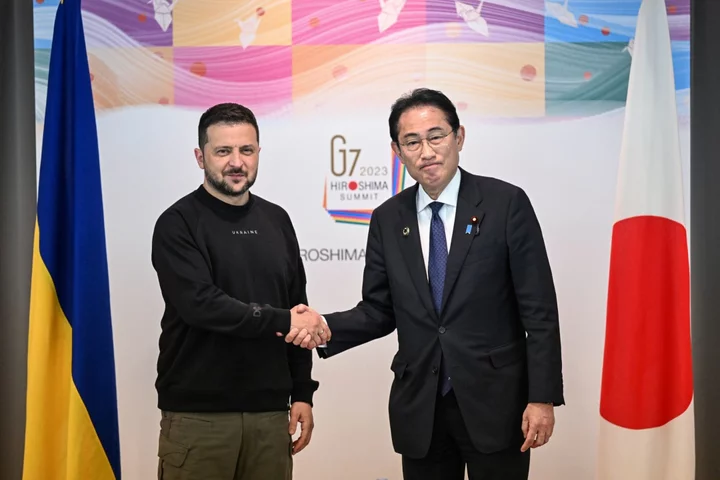Volodymyr Zelenskiy’s surprise visit to Japan for the Group of Seven summit in Hiroshima met a warm public welcome and may bolster enough support for his host Prime Minister Fumio Kishida to prompt him to call an early general election.
Kishida’s coup in hosting the Ukrainian president on his first visit to Asia since Russia’s full-scale invasion adds to broader reputational gains from hosting the global leaders in his hometown of Hiroshima. TV channels went live as Zelenskiy was driven from the airport to the city flattened by the bomb almost 78 years ago, with people taking to the streets to try to catch a glimpse of him.
A poll carried out by the Mainichi newspaper during the two days Zelenskiy was in Japan showed Kishida’s support rate leaped by 9 percentage points to 45%. Another survey by the Yomiuri newspaper over the same time period also found a 9 percentage point surge to 56%.
“It’s obvious they should do it now,” said Shibenobu Tamura, a political analyst and former staffer with the ruling Liberal Democratic Party. “The LDP will swing into action.”
Kishida’s approval ratings had already been recovering over the past two months, prompting speculation he would seize the opportunity to set a date for an election. Though no vote need be held until 2025, renewing his mandate while approval is relatively high would shore up his position at the helm of the LDP ahead of a party leadership contest next year.
It would also help him maintain control of his long-ruling LDP amid an internal battle over how to pay for the deeply indebted country’s plans for a 60% hike in defense spending and a doubling of outlays on children and families. Voters struggling with rising prices are mostly opposed to any new tax hikes.
Local media outlets such as Kyodo News have speculated a vote could come as early as late June, after the parliament dominated by Kishida’s ruling party approves a government package of fiscal and policy measures aimed at supporting families and heading off a demographic crisis that poses long-term economic risks.
Hiroshima Visit
Kishida reiterated his denial that he was currently thinking of calling a vote at a press conference after the G-7 summit came to a close Sunday.
In a scene full of symbolism a few hours later, he and Zelenskiy laid flowers together at a monument to the tens of thousands of victims of the 1945 atomic attack, while Zelenskiy told journalists that photographs of the aftermath reminded him of the ruins of Bakhmut and other Ukrainian communities. The only country to suffer a wartime nuclear attack, Japan has repeatedly condemned Russia’s threats to use atomic weapons in its war on Ukraine.
The Japanese premier’s own visit to Kyiv in March helped turn around public opinion, which had slid to dangerously low levels after a series of scandals and mis-steps last year.
The recent warming of long-fraught ties with South Korea has also met with public approval, at least in Japan, as did Kishida’s decision to keep on campaigning in an April by-election after an attempted pipe-bomb attack.
Public support for Ukraine remains strong in a country where many fear a failure to push back against Russia could embolden China to take similar action against the democratically governed island of Taiwan. A survey by the Nikkei newspaper in February found two thirds of respondents said Japan should continue to support Ukraine even if doing so affected jobs and livelihoods.
Still, even with the stock market hitting its highest level since 1990 last week and data showing the economy expanding at a faster pace than expected, Kishida won’t have everything on his side if he does opt to call an election soon.
A $518 Billion Rally Shows Japan Stocks Are All the Rage in 2023
While Kishida’s pledge to bring about wage hikes has yielded some results, persistent inflation has undercut the effect, leaving many voters worse off than before, despite government subsidies on utilities.
The LDP is also set to lose 10 constituencies in rural areas in the latest revision of seat numbers to reflect the ongoing population drift to the cities. Kishida’s party is engaged in a battle with its longtime coalition partner Komeito over which of them will run a candidate in a new constituency that’s been created in Tokyo, according to Jiji Press and other media.
There’s the potential threat from the upstart opposition Japan Innovation Party, also known as Ishin, which showed strength outside its traditional base of Osaka in a series of local elections in April. The right-leaning party favors spending cuts and lower taxes.
“There’s a need for another option,” Osaka governor and prominent Ishin member Hirofumi Yoshimura said in an interview this month. “There will be an election in the next few months and we are preparing quickly to be able to go head-to-head with the LDP.”
--With assistance from Takashi Hirokawa.
(Updates with comment from former LDP staffer in fourth paragraph.)

